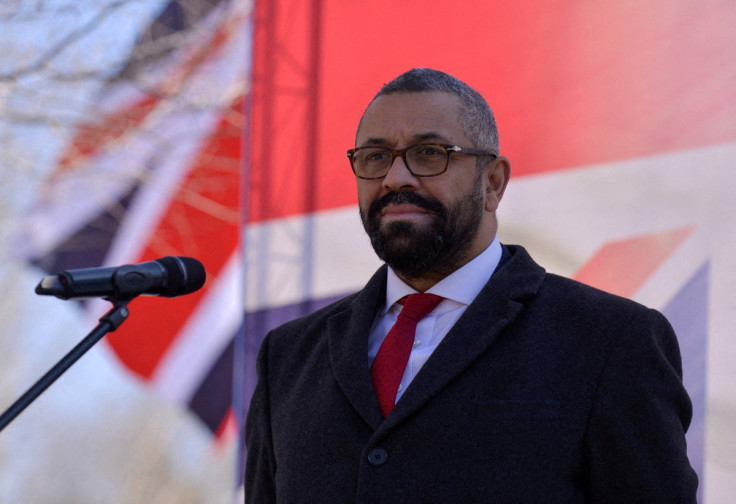British Foreign Secretary flags Latin America's importance for the future of the global international order
British Foreign Secretary James Cleverly has articulated Britain's support for Brazil's permanent membership of the United Nations Security Council.

British Foreign Secretary James Cleverly has made a keynote speech in Santiago, the capital of Chile, with the purpose of celebrating the 200-year relationship between Britain and Latin America and establishing an "ambitious future partnership".
Latin America entails the entirety of South America as well as Mexico, Central America, and the Caribbean islands. What these regions share is a common experience of colonial rule under the Spanish and Portuguese from the 15th to the 18th century.
Cleverly referred to the "revolutionary period" 200 hundred years ago in which Latin America struggled to gain independence. In his view, "the struggle for independence" undertaken by Latin America "was surely one of the most uplifting episodes of the momentous revolutionary era that laid the foundations of the modern world".
After commenting on the history of Latin America, Cleverly focused on the common values and "shared bonds" between Britain and the region.
Common values in a "new era of geopolitical competition"
According to Cleverly, two centuries after this "revolutionary period", today "the tectonic plates of world politics are shifting again". In his view, he added: "We are living through the beginning of a new era of geopolitical competition."
These comments echo those of the Japanese Prime Minister in the build-up to the recent G7 summit in Hiroshima. According to him, particularly given the Russian invasion of Ukraine, "the international community is now at a historic turning point".
A key dimension of today's international world in the Foreign Secretary's worldview is a "battle of ideas". One over the "nature and future of the international order."
"Our position is clear," he said, as he went on to highlight key values shared between Britain and Latin America. For example, Cleverly listed "respect for sovereignty, respect for territorial integrity, respect for self-determination and human rights" as norms which must "prevail" in the current period of geopolitical tension.
Most obviously, these values have been threatened by Russia's attempt to invade Ukraine.
In addition, Cleverly also explained that democracy, the rule of law, liberty and freedom are common values held between Britain and Latin America. Crucially, the objective of "protecting self-determination and democracy" is a key challenge alongside that of addressing the threat posed by climate change.
Referring to Britain's ties with Latin America, the Foreign Secretary stated that "together we have a strong democratic voice in favour of the rules-based international order".
Cleverly did not mention China in his speech. However, British Prime Minister Rishi Sunak recently stated that China poses "the biggest challenge of our age to global security and prosperity", referring to their "increasingly authoritarian at home and assertive abroad". Moreover, China is one centre of power that challenges Western norms and ideas.
The Representation of Latin America
Whilst the universal values which underpin global order remain constant, Cleverly argued that the world's multilateral institutions require reform to give greater representation to Latin America. In his words: "We need strong multilateral institutions, representing the world as it is today, economically, politically and demographically." This, however, is "not currently the case".
Cleverly asserted that the nation-states of the Latin American region have a "decisive role to play" in shaping the future international order of the 21st century.
Referring to the population growth of recent decades, he explained that the economic and demographic significance of Latin America means the region has a "pivotal role" in contributing to the maintenance of international order.
British foreign policy advocates that Brazil should be a permanent member of the United Nations Security Council (UNSC). Brazil possesses the tenth-largest economy in the world and is a member of the BRICS and the G20. From 2003 to 2014, economic progress raised 29 million people out of poverty in Brazil.
The purpose of the UNSC is to ensure international peace and security by managing disputes between nations. All UN Member States must comply with UNSC decisions according to the Charter of the United Nations. UNSC members possess a single vote, but only the permanent five (the United States, China, Russia, Britain, and France) possess the power to veto UN resolutions.
Moreover, whilst one might doubt the relevance of international institutions like the UN in a world dominated by great power politics, the elevation of Brazil to the status of a permanent member would arguably reflect the significance of Latin America in today's world.
International Trade
This year Britain has gained accession to the Central Progressive Trans-Pacific Partnership (CPTPP), a trading bloc that includes the Latin American Nations of Mexico, Peru, and Chile. However, Cleverly highlighted the potential to do more to enhance trade between Britain and Latin America.
Latin America has a combined GDP amounting to nearly $6 trillion with a population of 660 million people. This makes it an area of economic potential for Britain's future trading relationships.
Trade and investment between Britain and Latin America made a strong recovery following the "post-pandemic low", with a "massive" increase of 45 per cent in the total value of imports and exports last year, Cleverly explained.
However, the Foreign Secretary also noted that Latin America represents just two per cent of British imports and two and a half per cent of worldwide British exports, explaining that "there is much more to do on trade and investment".
Cleverly referred to progress made on the drafting of a free trade agreement between Britain and Mexico. The third round of talks on a free trade agreement between Britain and Mexico were concluded last week according to Cleverly.
Following Brexit, the UK-Mexico Trade Continuity Agreement was signed to replace the EU-Mexico agreement. However, negotiations for a new trade deal between Britain and Mexico kicked off back in May 2022.
© Copyright IBTimes 2024. All rights reserved.





